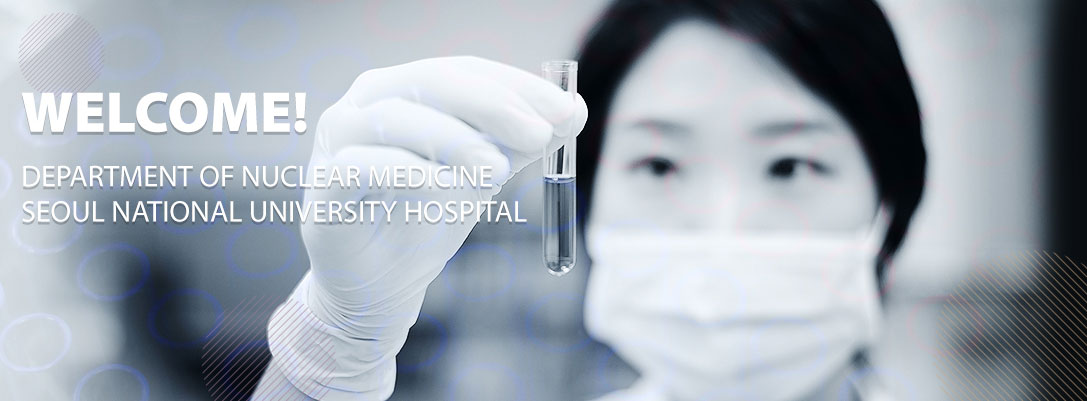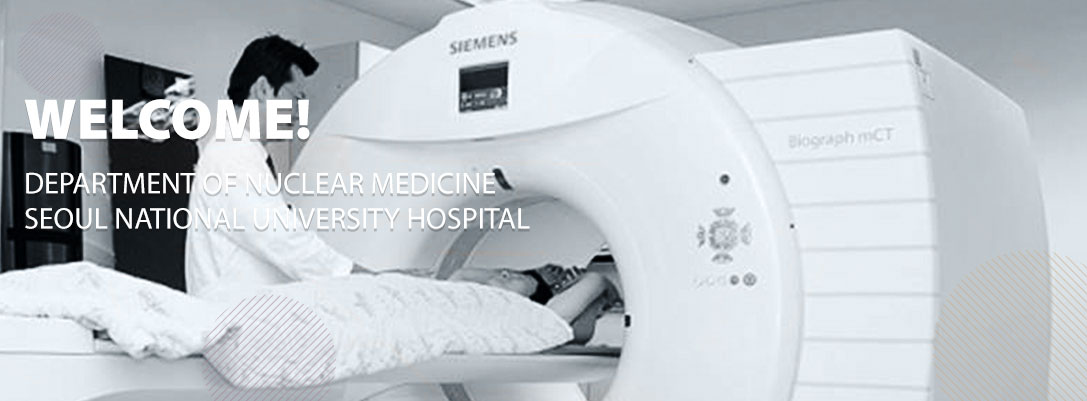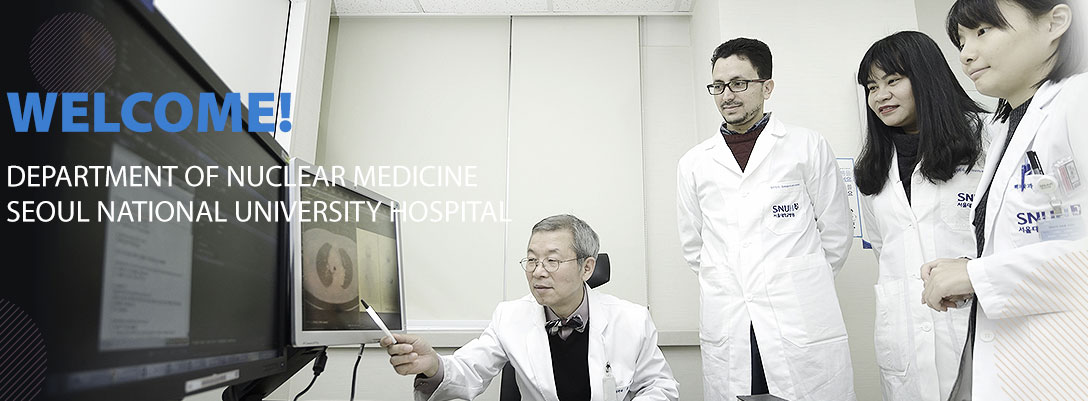해외의료인 연수 프로그램_핵의학과
페이지 정보
작성자 : NMSNUH 작성일2012-12-20 조회8,502회관련링크
본문
Training Program for Foreign Fellows at<?xml:namespace prefix = o ns = "urn:schemas-microsoft-com:office:office" />
Department of Nuclear Medicine, SNUH
1. Introduction
ABOUT US
The Department of Nuclear Medicine at Seoul National University Hospital is committed to improving health through excellence in patient care, research, and education. Based on the knowledge about functions of the organs and nature of diseases, we provide superb medical services for diagnosing and treating a variety of diseases. To develop more effective strategies to conquer diseases, we are actively pursuing biomedical researches through the close collaboration between physicians and scientists. In addition, we manage training programs for the future physicians and scientists, not only for intramural members but also for international applicants. Twelve faculty members, 50 nuclear medicine technologists, 40 researchers, 15 nursing or administrative members are working for the patient care and researches.
From 2002 to 2006, the former Professor Myung Chul Lee had been the president of World Federation of Nuclear Medicine and Biology (WFNMB) and Prof. June-Key Chung had been the secretary general of WFNMB. With our experience of rapid development, we are trying to dedicate ourselves to the worldwide expansion of nuclear medicine, especially in the developing countries. For that purpose, we are actively participating in the program of WFNMB, ARCCNM (Asian Regional Cooperative Council for Nuclear Medicine), ASNM (<?xml:namespace prefix = st1 ns = "urn:schemas-microsoft-com:office:smarttags" />AsianSchool of Nuclear Medicine), ASMI (Asian Societies of Molecular Imaging), and so on. At present, we are the only cooperative site of IAEA (International Atomic Energy Agency) for the education and training of nuclear medicine, and we are managing fellowship and international scholarship programs.
PATEINT CARE
As a world-leading group in the field of nuclear medicine, we provide state-of-the-art medical services in diagnosing and treating disease;
n Diagnostic Imaging
Using diverse radioactive tracers, nuclear medicine can visualize the status of diseases and monitor effect of a treatment through medical imaging in living body. For diagnostic imaging, we currently have 8 gamma cameras, 2 SPECT/CT scanners, 3 PET/CT scanners, and 1 PET/MR scanner.
1. PET
PET (positron emission tomography) is an imaging tool using positron-emitting radiotracers. Various PET tracers have been developed and are in use. With an adequate radiotracer, cancer lesions, viable myocardium, and metabolic status of brain can be diagnosed. At present, we can offer various PET tracers with active support of radiopharmacy.
• 18F-FDG: For glucose metabolism
• 18F-FLT: For nucleic acid metabolism
• 18F-FP-CIT: For DA transporter
• 11C-Methionine: For amino acid metabolism
• 11C-Acetate: For fatty acid metabolism
• 11C-PIB: For amyloid plaques in Alzheimer’s disease
• 68Ga-RGD: For angiogenesis
• 13N-Ammonia: For myocardial perfusion
• Etc.
2. Gamma camera, SPECT, and SPECT/CT
Gamma camera is a traditional imaging tool in nuclear medicine, using diverse radiotracers labeled with gamma-emitters such as 99mTc, 201Tl, 123I. SPECT (single photon emission computed tomography) is a reconstructed gamma camera image to show 2-D tomographic images. Many gamma camera imaging is available in our department.
• Bone scan
• Myocardial perfusion SPECT (/CT)
• Brain perfusion SPECT (/CT)
• Thyroid scan
• Renal scan
• Liver scan
• Hepatobiliary scan
• White blood cell scan (for infection)
• Parathyroid scan (SPECT/CT)
• Salivary gland scan
• Lymphangiography
• Spleen scan
• Etc.
n Diagnostic Laboratory
In aid of diagnosis, our department operates diagnostic laboratory using radiotracers, in which approximately 700,000 cases of laboratory studies are performed in a year. Assays using radiotracers can provide extremely sensitive and accurate results. RIA (radioimmunoassay) and IRMA (immunoradiometric assay) studies are performed to measure very small amounts of biological materials such as hormones and tumor markers. In addition, some important functional parameters of living body such as GFR (glomerular filtration rate) can be measured in the laboratory.
• Thyroid hormone (T3, T4, TSH, Tg, TgAb, etc.)
• Sex hormone (LH, FSH, etc.)
• Viral markers (HBV, HCV, etc.)
• Tumor markers (AFP, CEA, PSA, etc.)
n Radioisotope Therapy Clinic
Radioisotope therapy is a kind of cancer therapy using radiopharmaceuticals that emit destructing radiation. Targeted radiopharmaceuticals can be accumulated in cancer tissue and destruct them by radiation. Radioisotope therapy clinic of our department has been operated for more than 40 years. The most important target of radioisotope therapy is thyroid cancer, at present. However, we are trying to expand the scope of radioisotope therapy by developing novel therapeutic radiopharmaceuticals.
At present, clinics for outward patients and 1 therapy room is in operation for several diseases.
• Thyroid Cancer
• Palliation of metastatic bone pain
• Lymphoma
• Neuroendocrine tumors
• Etc.
RESEARCHES
We are pursuing many research programs not only for the purpose of academic development but also for the purpose of enhancing the quality of medical services. As one of the world’s best research centers, our department has made every endeavor to develop innovative methods in diagnosis and therapeutics of diseases. As a result, we present 20~30 research articles in the Annual Meeting of the Society of Nuclear Medicine in USA every year, by which we are within the top three groups in the world. We have diverse research laboratories in harmony.
n Clinical Nuclear Medicine
• General nuclear medicine
• PET oncology with new tracers
• Nuclear cardiac imaging for ischemic heart disease and atherosclerosis
• Neuroimaging for Alzheimer disease, vascular diseases, and movement disorder
• Radioisotope therapy
• Innovative medical fusion imaging (PET/MRI)
• Translational research of molecular imaging
n Radiochemistry
• Development of new PET tracers for tumor using angiogenesis and hypoxia
• Development of new PET tracers for ischemic heart disease
• Development of 99mTc-based radiopharmaceuticals
• Development of therapeutic radiopharmaceuticals
• Improvement in compounding methods (developing kits)
n Nuclear Medicine Physics
• Development of new imaging devices (PET/MRI, animal SPECT)
• Enhancement of image reconstruction (new algorithms)
• Tracer kinetics analysis for new imaging agents
• Radiation dosimetry
n Molecular Imaging and Nanomedicine
• Reporter gene imaging for gene or protein expression
• Gene therapy using radioisotope
• Development of biomarkers for targeted imaging and therapy (miRNA, aptamer)
• Application of nanoparticle carriers in vivo
• Cell trafficking imaging
INTRODUCTION TO KOH CHANG-SOON FELLOWSHIP PROGRAM
Koh Chang-Soon Memorial Projects remember the spirit and pays a tribute to the late professor for his contribution to the development and emergence of nuclear medicine in Korea. The late Professor Koh established nuclear medicine and taught his trainees the spirit of “challenge and harmony”. His teachings encouraged his students for a long time, and they are entirely indebted to Professor Koh for the present success and the future of nuclear medicine in Korea.
International fellows had been trained for a period of 1 week to 6 months in ‘IAEA Collaborating Center for Nuclear Medicine’ in Seoul National University, which was established and named by IAEA in 2004. A new opportunity of international fellowship started in 2010, which supported the following three visiting scholars. The International Visiting Fellows, irrespective of physician or scientist/engineer, has been named as ‘Koh Chang-Soon Fellow’.
2. Faculty Members for Education & Training
|
Part |
Name |
Title |
Specialty |
|
MD |
Chung, June-Key |
Professor, Former chairman |
Oncology, Thyroid, MI |
|
|
Lee, Dong Soo |
Professor, Chairman |
Neurology, Cardiology, MI |
|
|
Kang, Keon Wook |
Associate Professor |
Oncology, MI, Nanomedicine |
|
|
Cheon, Gi Jeong |
Associate Professor |
Oncology, Therapy, MI |
|
|
Paeng, Jin Chul |
|







